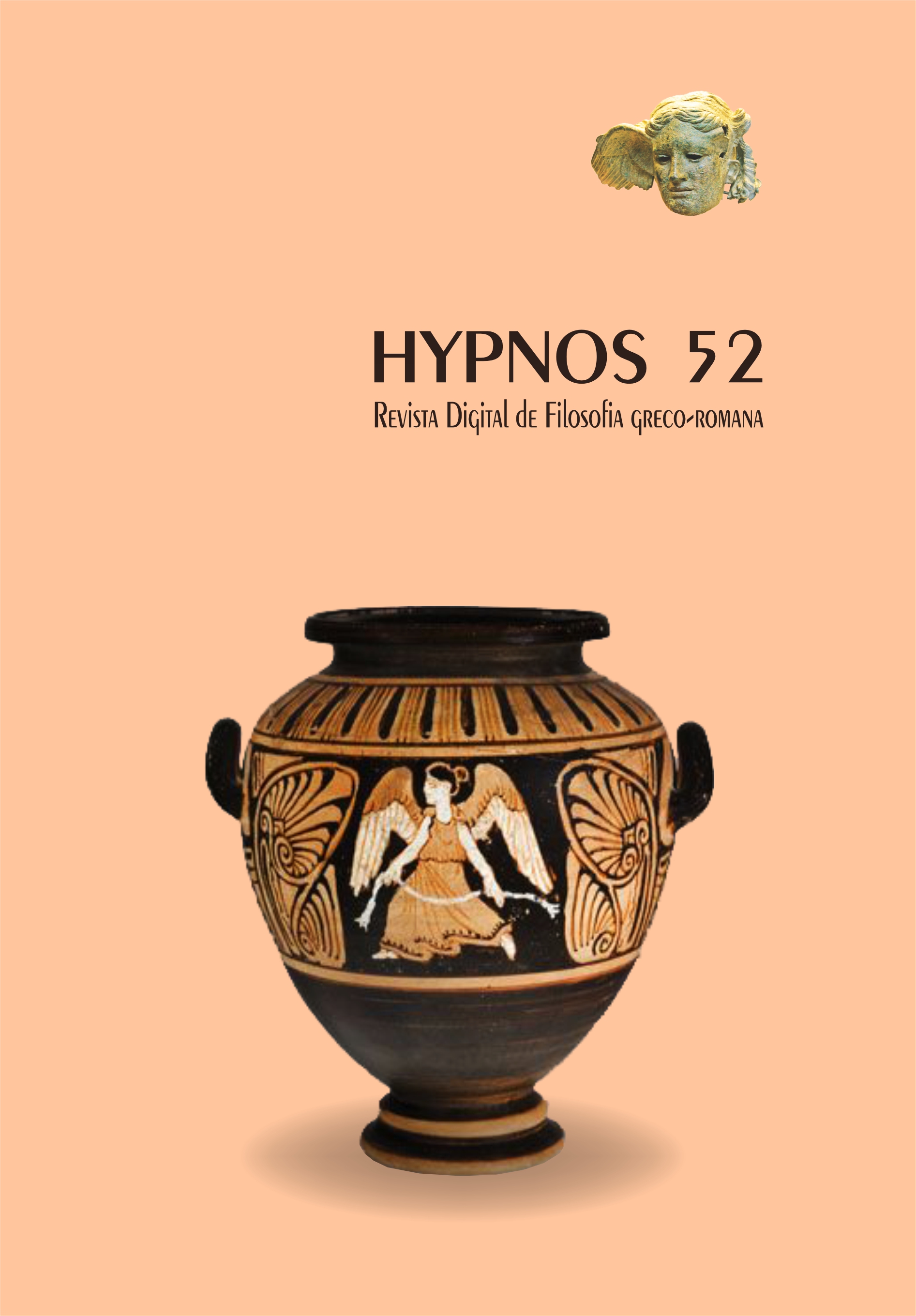Fear of death and misology in Plato’s Phaedo
Keywords:
Plato, Phaedo, death, misologyAbstract
This article aims to investigate the relationship between the dialogue Phaedo and the myth of Theseus and the Minotaur, described at the beginning of the dialogue. If Plato tends to insert Socrates as a philosophical hero in a dialogue that is permeated by the religious theme, opening with the mention of the festival of the Athenian delegation celebrating Theseus and ending with Socrates’ mention of a debt to Asclepius, such heroicity is in line with the representation of Socrates as the hero freeing himself and his companions from the Minotaur, represented by the threat to the soul through fear of death and misology.
References
BURGER, R. The Phaedo. A Platonic Labyrinth. New Haven: Yale University Press, 1984.
CASERTANO, G. Alma, morte e imortalidade. Archai Journal, n. 17, p. 137-157, 2016.
CORNELLI, G. A democracia sempre em vertigem: o que Platão pode nos ensinar. UnB Notícias. Brasília, 24 de out. de 2022. Disponível em <https://noticias.unb.br/artigos-main/6091-a-democracia-sempre-em-vertigem-o-que-platao-pode-nos-ensinar>. Acesso em 15 de nov. de 2022.
CORNELLI, G. A alma‑camaleão e sua plasticidade: dualismos platônicos no Fédon. Archai Journal, n. 16, p. 203‑222, 2016.
DACIER, A. Les oeuvres de Platon. Paris, 1699.
DINUCCI, A.; OLIVEIRA, F.; SILVA, C. Epicteto. Diatribes 2.1 a 2.6. Prometheus. n. 29, p. 89-115, 2019.
DIXSAUT, M. Le Naturel Philosophe: Essai Sur Les Dialogues de Platon. Paris: Librairie Philosophique J. Vrin, 2001.
DORTER, K. Plato’s Phaedo. An Interpretation. Toronto: University of Toronto Press, 1982.
FONTENROSE, J. Python. A study of delphic myth and its origins. California: University of California Press, 1980.
FUTTER, D. Socrates’ bull sacrifice (Phd. 117b5). Acta Classica, LVII, p. 233-240, 2014.
GONZALEZ, F. J. Why the Minotaur is Misology? In: CORNELLI, G.; ROBINSON, T.; BRAVO, F. (eds). Plato’s Phaedo: Selected Papers from the Eleventh Symposium Platonicum. Baden-Baden: Academia Verlag, 2018, p. 90-95.
REICH, H. Der Mimvs. Ein litterar-entwickelungsgeschichtlicher versuch. Berlin: Weidmannsche Buchhandlung, 1903.
JOHNSTON, S. I. Restless Dead. Encounters between the Living and the Dead in Ancient Greece. California: University of California Press, 1999.
KLEIN, J. A Commentary in Plato’s Meno. Chapel Hill: University of Carolina Press, 1979.
KLEIN, J. Lectures and Essays. Annapolis: St. John’s College Press, 1985.
McKIRAHAN, R. D. A filosofia antes de Sócrates. Uma introdução com textos e comentários. Tradução: Eduardo Wolf. São Paulo: Paulus, 2013.
NUCCI, M. Le lacrime degli eroi. Torino: Einaudi, 2014.
PATERA, M. Figures grecques de l’épouvante de l’antiquité au présent. Peurs enfantines et adultes. Boston: Brill, 2015.
PETERSON, S. An Authentically Socratic Conclusion in Plato’s Phaedo: Socrates’ Debt to Asclepius. Desire, Identity, and Existence: Essays in Honor of Terry Penner. p. 33-52, 2003.
PLATÃO. Fédon. Tradução, introdução e notas: Maria Teresa Schiappa de Azevedo. São Paulo: Ed. UnB, 2000.
PLATO. Phaedo. Translated with notes: David Gallop. Oxford: Clarendon Press, 1975.
PLATO. Phaedo. Translation, introduction and glossary: Eva Brann et al. Newburyport: Focus Pub., 1998.
PLATON. Phédon. Traduction, introduction et notes: Monique Dixsaut. Paris: GF Flammarion.
PLATONE. Fedone, o dell’anima. Dramma ético in tre atti. Traduzione, comento e note: Giovanni Casertano. Napoli: Paolo Loffredo Iniziative editoriali, 2015.
PLUTARCO. Vidas Paralelas: Teseu e Rómulo. Tradução do grego, introdução e notas: Maria Fialho e Delfim do Leão. Coimbra: Centro de Estudos Clássicos e Humanísticos, 2008.
PLATO. Phaedo. Edited by Christopher Rowe. Cambridge: Cambridge University Press, 1993.
SOBRINHO, R. G. N. Mito e argumento no Fédon. 2001. 214 f. Dissertação (Mestrado em Filosofia) - Faculdade de Filosofia e CIências Humanas, Universidade Federal de Minas Gerais, Minas Gerais, 2004.
WHITE, S. A. Socrates at Colonus. A Hero for the Academy. Reason and Religion in Socratic Philosophy. p. 151–75, 2000.
WYLER, S. Faire peur pour rire? Le masque des erotes. Cahiers des thèmes transversaux ArScAn. vol. 6, p. 68-70, 2005.
Downloads
Published
Issue
Section
License
Copyright (c) 2024 Hypnos Journal

This work is licensed under a Creative Commons Attribution-NonCommercial-ShareAlike 4.0 International License.
The contents of the manuscript have been tacitly or explicitly approved by the responsible authorities where the research was carried out.
Upon acceptation of the manuscript, the author agrees to allow its publication by Hypnos, declining pecuniary gains due from copyright. If the manuscript is published later in other media, the author agrees to always give credits of its first publication in Hypnos.
If the submitted document includes figures, tables, or large sections of text previously published, the author declares himself responsible for having obtained permission of the original copyright owners of these items for both the online and printed publication of this journal. Credits for copyrighted material must be properly attributed in the manuscript.


 A revista
A revista 